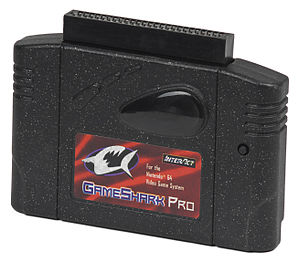Game Shark

"You wouldn't be trying to give yourself a bogus score using some ingenious trick would you? That's just about as low as anyone could possibly stoop! I can't believe you sometimes."
—Colonel Campbell, Metal Gear Solid 2
|
A Game Shark is a standard console cheat device, but it differs from a PC trainer in that it's usually a physical device. This idea became popular for consoles with the release of the Game Genie, which a cartridge could plug into, and the whole bit could plug awkwardly into the gaming machine. Aside from the delicateness of some components, game companies raised a stink about its legalities. In addition, this forced a rule into many old gaming magazines that any time you entered a contest for a high score in a video game, you had to send in a single picture that showed both the television with the game and score on display, and also the gaming console itself, to show that it was unadulterated.
Court cases on this issue would side in favor of the device maker, on the grounds that you bought the console and the game, you have every right to decide how you wanted to play it, including through the use of an external device.
Game Genies were dangerous for another reason, as they could cause save files to be corrupted, rendering some games broken. This can be seen on Animal Crossing on the Nintendo DS, where if a save is messed up the game will not load period, because your town is called at startup for the intro.
The switch to disc-based console games saw the Gameshark proper, Action Replay Max, and Codebreaker: sleeker devices with self-booting capabilities and even some multimedia tricks, with the assurance of not messing with saves directly. These devices have generally complied with companies' worries, although dedicated hackers can still use a fair amount of 'grey area' for tinkering.
Aside from the usual concerns about cheating, it's usually recommended to create backup saves in case a cheat inadvertently creates some problem later, or save immediately after a relevant cheat works and then restart to prevent unpredictable glitches.
There is also a small subset of games that are rather infamous for being "immune" to the devices, or difficult to play with them without locking up the game. Tri-Ace games such as Star Ocean: The Second Story or Valkyrie Profile can be cited, mainly because the coding values in these games aren't static. These can often be defeated with the use of an "activator code" on the cheat device. (The Star Ocean 2 one was about 29 lines long.)
A rare few games have unimplemented (and usually unfinished) content that can be accessed with one of these, including a sort of makeshift two-player mode in Final Fantasy Tactics (both parties are player-controlled, and two players can pass the controller back and forth; the first party winning is a "win" with the usual consequences and the second party winning is a "loss"), unfinished characters in several Fighting Games, the almost-finished Bottle's Revenge two-player mode in Banjo-Tooie, and the infamous sex minigame in one of the Grand Theft Auto games.
More common are games released in multiple regions that have content which is unlockable in one region but not another, or is simply inaccessible through normal play. The Pokémon games, for example, typically have at least one Mon that's available only through use of a glitch, through a Wi-Fi/company-licensed event, or the use of a Game Shark. Exactly whether or not using the Game Shark for this purpose is considered cheating is still up for debate.